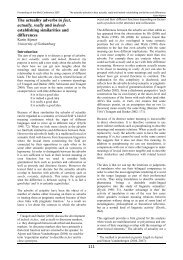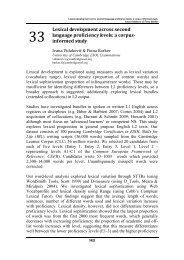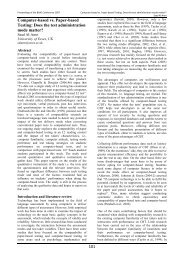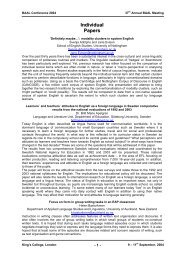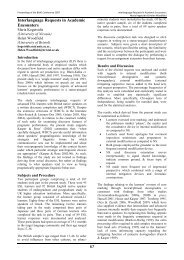Proceedings of the - British Association for Applied Linguistics
Proceedings of the - British Association for Applied Linguistics
Proceedings of the - British Association for Applied Linguistics
You also want an ePaper? Increase the reach of your titles
YUMPU automatically turns print PDFs into web optimized ePapers that Google loves.
The Impact <strong>of</strong> <strong>Applied</strong> <strong>Linguistics</strong>: <strong>Proceedings</strong> <strong>of</strong> <strong>the</strong> 44th Annual Meeting <strong>of</strong> BAAL<br />
University <strong>of</strong> <strong>the</strong> West <strong>of</strong> England<br />
hardly any problems to identify texts written by non-native speakers <strong>of</strong><br />
English. However, this study also suggests that phraseological mistakes and<br />
a wrong choice <strong>of</strong> register give away <strong>the</strong> identity <strong>of</strong> <strong>the</strong> writer even more<br />
clearly than grammatical errors do. Fur<strong>the</strong>rmore, L1 teachers <strong>of</strong> English<br />
tend to be more tolerant in <strong>the</strong>ir evaluation than non-native speakers are;<br />
especially with phrases, which are quite close to <strong>the</strong>ir own mo<strong>the</strong>r tongue<br />
in wording and structure. On <strong>the</strong> o<strong>the</strong>r hand non-native speakers without an<br />
EFL background are more easily mislead by a very confident, non-learnerstereotypical<br />
style.<br />
These findings support two suggestions, namely, once more <strong>the</strong> assertion<br />
that <strong>the</strong>re is in fact such a thing as a learner group specific phraseology and<br />
that native like phraseology within a text does not only trigger a<br />
corresponding evaluation <strong>of</strong> <strong>the</strong> authors background but also that <strong>the</strong>se<br />
factors are partly more influencing than <strong>for</strong> example grammar. Hence <strong>the</strong><br />
use <strong>of</strong> native-like phraseology within a text seems to be a ra<strong>the</strong>r influential<br />
factor, which should be taken into consideration in <strong>the</strong> assessment <strong>of</strong><br />
linguistic competence as well as <strong>for</strong>eign language teaching and teacher<br />
training.<br />
References<br />
Sylvie de Cock (1999) Repetitive phrasal chunkiness and advanced EFL speech and<br />
writing. In Christian Mair and Marianne Hundt (eds.) Corpus <strong>Linguistics</strong> and<br />
Linguistic Theory. Papers from <strong>the</strong> Twentieth International Conference on<br />
English Language Research on Computerized Corpora (ICAME 20), Radopi:<br />
Amsterdam & Atlanta.<br />
Franz Josef Hausmann (1984). Wortschatzlernen ist Kollokationslernen. Zum Lehren<br />
und Lernen französischer Wortverbindungen. In Praxis des neusprachlichen<br />
Unterrichts, 31 (4), 1984, pp395-406.<br />
Thomas Herbst (1992). Pro-Nunciation: Zur Bedeutung einer guten Aussprache in der<br />
Fremdsprache. In Die Neueren Sprachen, 91 (1), 1992, pp2-18.<br />
Brigitta Mittmann (2004). Mehrwort-Cluster in der englischen Alltagskonversation.<br />
Unterschiede zwischen britischem und amerikanischem gesprochenen Englisch<br />
als Indikatoren für den präfabrizierten Charakter der Sprache. Gunter Narr:<br />
Tübingen, Germany.<br />
John Sinclair (1991). Corpus, concordance, collocation. Ox<strong>for</strong>d University Press:<br />
Ox<strong>for</strong>d, UK.<br />
Birgit Waibel (2008). Phrasal verbs – German and Italian Learners <strong>of</strong> English<br />
Compared. Vdm Verlag: Saarbrücken, Germany.<br />
Allison Wray (2000). Formulaic Sequences in Second Language Teaching: Principle<br />
and Practice. In <strong>Applied</strong> <strong>Linguistics</strong>, 21 (4), 2000, pp463-489.<br />
78



